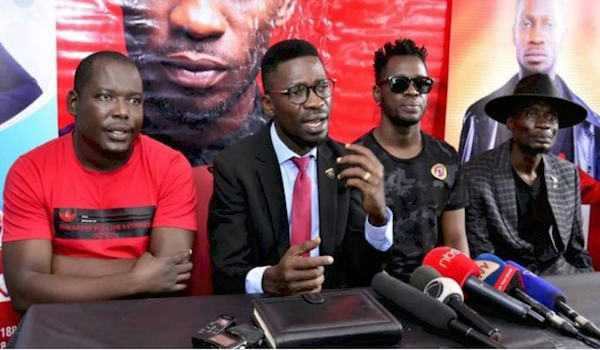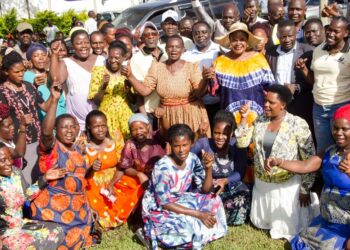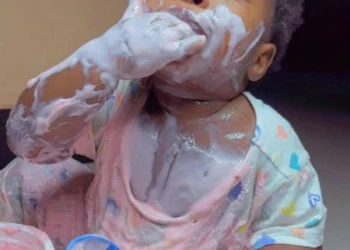Robert Kyagulanyi Ssentamu, popularly known as Bobi Wine, has reshaped Uganda’s political landscape, blending urban subculture with a confrontational style critics argue has introduced a gangster ethos into the nation’s politics. From his roots as a musician to his rise as a political force, Bobi Wine’s journey reflects a complex interplay of charisma, defiance, and controversy.
Born in 1982 in Gomba district, Bobi Wine grew up in Kampala’s Kamwokya slum, a crucible of poverty that shaped his worldview. His musical career began modestly, forming the Fire Base Crew with Bebe Cool in 2002, later splitting to create the Ghetto Republic of Uganja. These early “music gangs” fostered a rebellious identity, with Bobi Wine embracing titles like “Omubanda wa Kabaka” (Buganda’s gangster) and “Ghetto President.” His songs, such as Kiwani and Akalimu, championed resilience against poverty, introducing slang like “kiwani” (fake or hustle) into Uganda’s street lingua. A Makerere University alumnus with a degree in Music, Dance, and Drama, Bobi Wine’s education lent credibility to his artistic activism, though his public marijuana advocacy sparked controversy, alienating some middle-aged voters.
Bobi Wine’s influence on urban subculture was profound. His self-styled monikers—“Ghetto Gladiator,” “Ghetto President”—resonated with disenfranchised youth, who saw him as a symbol of defiance against systemic inequality. His music, blending Afrobeat with social justice themes, galvanized a generation, particularly in Kampala’s slums. By 2011, his lyrics grew overtly political, critiquing government corruption and earning him both fans and censorship. His concerts, often banned, blurred the line between performance and protest, cementing his role as a cultural disruptor.
In 2017, Bobi Wine’s political ascent began with a landslide victory in the Kyadondo East parliamentary by-election, defeating National Resistance Movement (NRM) and Forum for Democratic Change (FDC) candidates. Declaring, “If parliament won’t go to the ghetto, the ghetto will go to parliament,” he positioned himself as an outsider challenging Uganda’s elite. His victory, driven by urban youth, signaled a shift in the electorate’s dynamics, with 78% of Ugandans under 30—a demographic Bobi Wine mastered.
Initially, Bobi Wine launched the People Power movement, a loose coalition uniting opposition factions against President Yoweri Museveni’s 38-year rule. In 2020, he formalized this into the National Unity Platform (NUP), which quickly became Uganda’s largest opposition party, securing 57 parliamentary seats in 2021. However, NUP’s rise decimated other opposition groups like the FDC and Democratic Party (DP). Critics allege Bobi Wine’s predatory tactics—demanding hefty fees for NUP endorsements and sidelining rivals like Kizza Besigye—fractured the opposition, with some accusing him of being an NRM mole to weaken figures like Besigye.
Bobi Wine’s challenge to Museveni and the NRM introduced a confrontational style critics label “egaali” (gangsterism). NUP’s rhetoric, rooted in street bravado, framed politics as a battle for justice, but this approach has birthed a darker side. NUP activists, often urban youth dubbed “bayaaye”, have been linked to crimes, including vandalism during protests and online bullying of dissenting voices. Supporters like Fred Lumbuye and Eddie Mutwe have faced accusations of spreading divisive propaganda, targeting opposition figures like Besigye with insults and threats. Such tactics, critics argue, foster intolerance and erode constructive dialogue.
The negative effects of this gangster culture are stark. Uganda’s politics, already polarized, has grown more volatile, with violence marking the 2021 elections—54 protesters killed, hundreds of NUP supporters detained. The glorification of “egaali” risks normalizing lawlessness, alienating moderate voters and undermining democratic norms. Online “exhibitions” exposing state failures, while creative, often descend into vitriol, further entrenching division. This confrontational style also invites state repression, with abductions and torture of NUP activists becoming commonplace, perpetuating a cycle of violence.
For sober Ugandans to reclaim the political narrative, a return to principled engagement is essential. First, opposition leaders must prioritize coalition-building over personal ambition, learning from past failures like the Inter-Party Cooperation. Civil society and media, stifled by state harassment, need international support to amplify moderate voices. Electoral reforms, long ignored, are critical to restoring trust in institutions like the Electoral Commission. Finally, youth engagement must shift from street protests to civic education, channeling their energy into policy advocacy rather than confrontation.
Bobi Wine’s rise has undeniably energized Uganda’s youth, but his gangster-inspired politics risks deepening division and violence. By fostering dialogue and institutional reform, Ugandans can harness this energy for a more inclusive future, ensuring the “ghetto” voice strengthens democracy rather than destabilizes it.
Do you have a story in your community or an opinion to share with us: Email us at editorial@watchdoguganda.com












